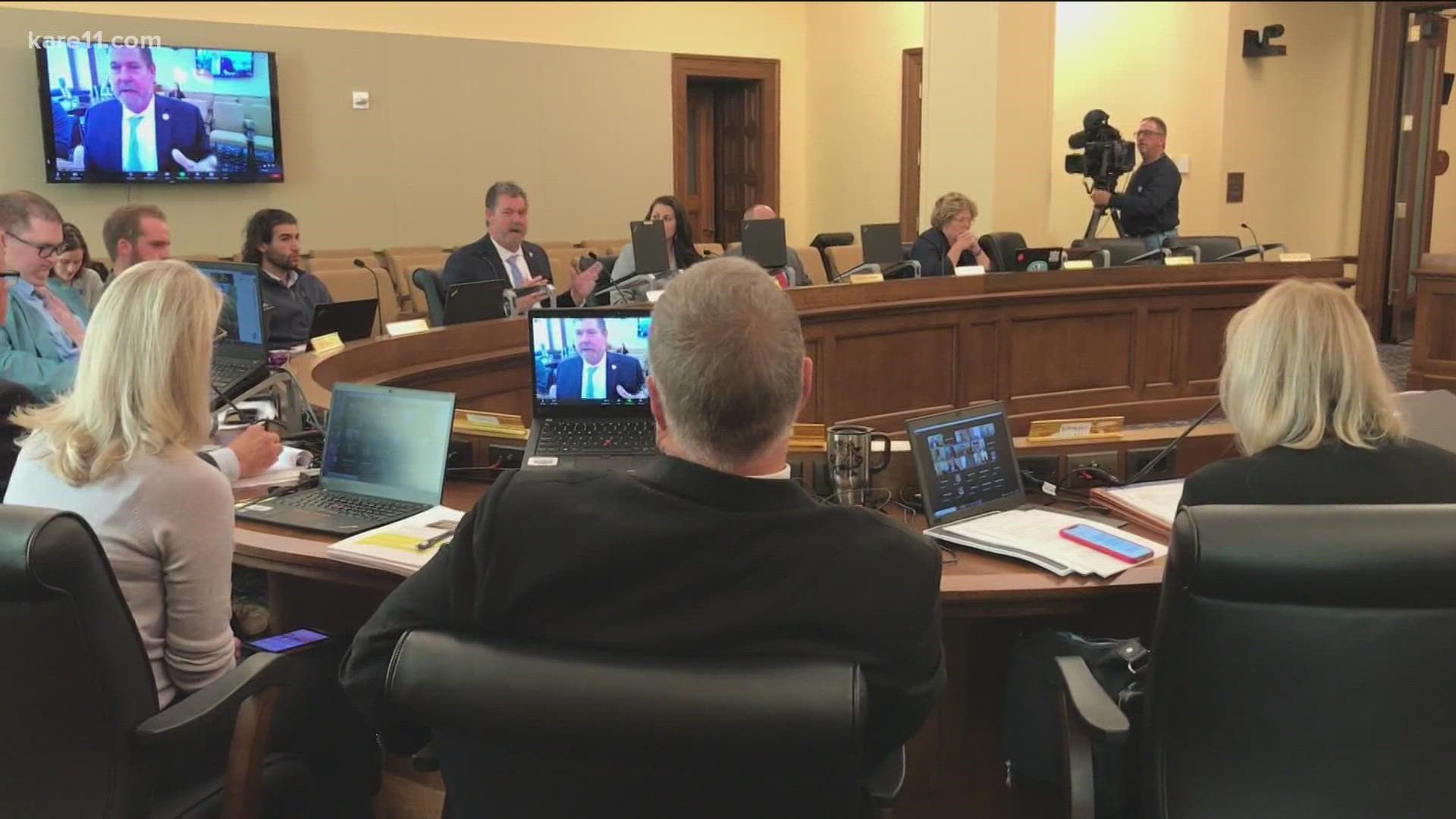ST PAUL, Minn. — They wanted to hear from law enforcement leaders. And they did, for nearly three hours.
Chiefs and sheriffs gave their takes on the rising crime rates in Minnesota in a joint meeting of the Senate Public Safety and Transportation Committees Thursday. The conversation covered an array of issues, including police morale, staffing issues, and the law enforcement community's frustrations with some police and judicial reforms.
"Our job is to find the bad guy and arrest him. When we do, imagine how frustrating that is if you're the officer and before you finish your report that person's back out on the street," St. Cloud Police Chief William Blair Anderson told lawmakers.
He said he's been frustrated that suspects released on bail, or convicted persons serving probation, are free do continue to commit more crimes. In some cases, Chief Anderson said, federal prosecutors have agreed to file charges that result in more time behind prison walls.
Minneapolis and St. Paul are already on pace to set new single-year records for homicides, with an alarming increase in the number of youths injured and killed by gunfire. The murder tally statewide jumped by 58%, from 117 in 2019 to 185 in 2020, according to the FBI statistics.
"We saw huge increases in violence in August and September of 2019 putting us on pace to where we are now," Ramsey County Sheriff Bob Fletcher told senators.
"The trend you’re seeing now began well before the pandemic, and well before George Floyd’s murder. (Minneapolis) Chief (Medaria) Arradondo asked for 200 more officers in 2019, before any of the pandemic or before George Floyd’s murder."
Fletcher said the huge increase in car thefts, especially committed by youth, is fueling much of the new crime wave. He called auto theft a gateway crime that eventually leads to gang activity and gun violence.
"Auto theft has evolved into carjacking, street robberies, burglaries. These kids are using these stolen cars as a passport to committing other crimes."
He advocated for more youth intervention programs that can get teens out of the cycle of gang influence and drug use and focus on the mental health and addiction issues they face.
On the enforcement side, Fletcher asked lawmakers to pass a bill increasing penalties for those who break other laws while fleeing from police, such as driving through stop lights or driving the wrong way in the opposite lane.
The legislature won't be in regular session again until February, and there aren't any specific bills pending to curb violent crime. That's why some DFL lawmakers questioned the timing of the Republican-led hearing. It comes as Minneapolis voters are considering a ballot question that would, among other things, remove the minimum police staffing levels from that city's charter.
And, to that point, Fletcher testified that the crime problem in Minneapolis will only get worse if the police staff continues to shrink, something he said is quite possible if Minneapolis voters approve Ballot Question 2. That question would convert the police department into a division inside a larger public safety department, and replace the position of police chief with a director of public safety.
Mental Health
Several of the chiefs and sheriffs who spoke talked about the need for more mental health spending by the state, to take pressure off police officers and deputies who currently spend their much of their time responding to persons undergoing a mental health crisis.
Chief Anderson said the social worker co-responder model has worked will in St. Cloud and he'd like to expand it because it has been successful in eliminating repeat calls about the same individuals who need mental health intervention.
Democrat Karla Bigham of Cottage Grove thanked Fletcher and Anderson for bringing up that that issue, and said if her Republican colleagues were looking for solid solutions they should've invited mental health social workers and other experts to the meeting.
"I thank the sheriffs for talking about how well this works, because we do need to get to the root of what the crime is, and what's causing crime. It is mental health," Sen. Bigham said.
Transportation Committee Chair Scott Newman hinted that the main purpose of the meeting was to confront Ramsey County Attorney John Choi for his decision to stop prosecuting felonies that arise from non-safety traffic stops. But Choi turned down the invitation.
"John Choi was invited to come, encouraged to come, and I'm candidly very disappointed he's not here," Sen. Newman said.
Choi announced the new approach in September surrounded by community leaders. He said it was on statistical evidence that African American motorists in St. Paul are four times more likely to be stopped for vehicle equipment violations, which has traumatized BIPOC motorist and led to distrust of law enforcement.
He also cite stats that guns are only recovered in two percent of all "pretextual" stops by law enforcement.
Since Choi wasn't there, Newman asked Sheriff Fletcher to give testimony about the value of routine traffic stops in detecting more serious crimes and firearm violations. Fletcher said those stops are very instrumental in stopping other criminal activity.
Newman also asked Fletcher if his deputies intentionally target Black drivers, and Fletcher said they don't.
On the staffing front, the chiefs and sheriffs also said they believe the recruitment problems are tied to the morale hit suffered by rank-and-file officers have due to to civil unrest, the feeling they've lost public support and media coverage that place officers in a negative light.
Currently more than 100 Minneapolis officers are on paid Workers Compensation leave after filing claims for Post-Traumatic Stress Disorder. The city is on track to spend $24 million in 2022 just for officers who are on leave but not able to work yet.

